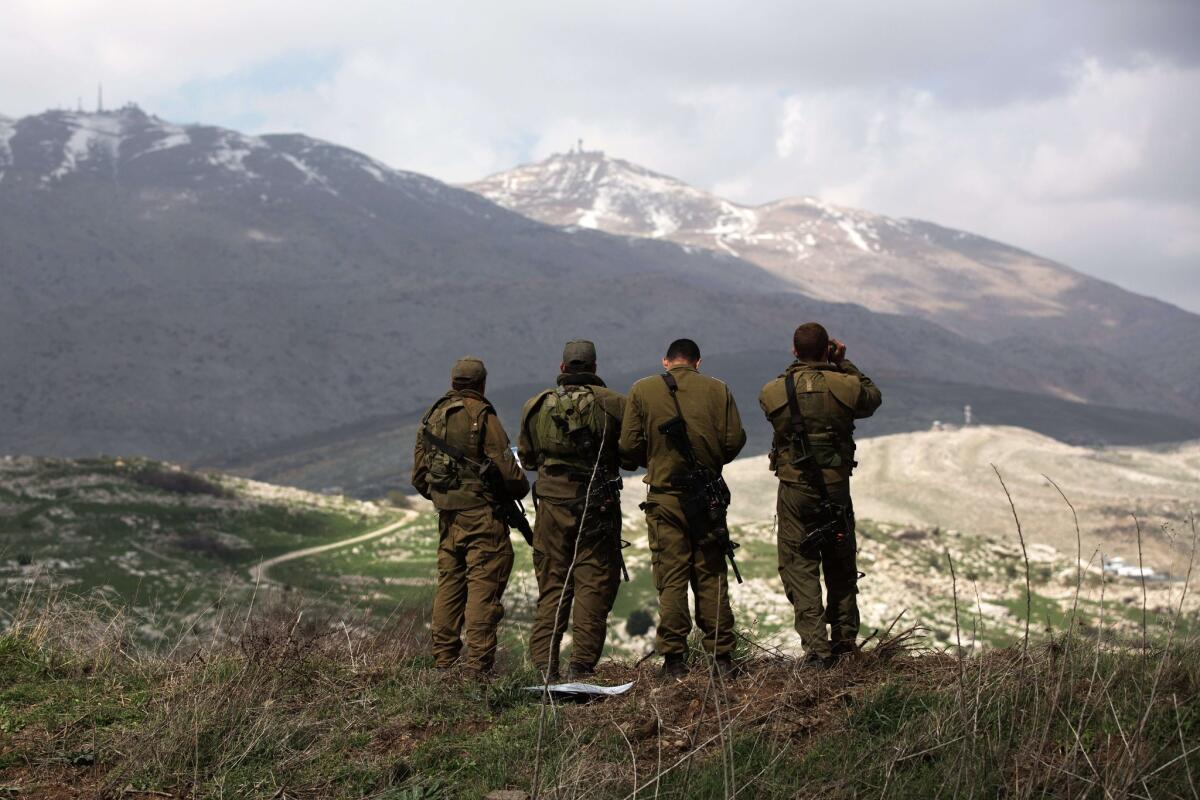Israel-Syria tensions are high following cross-border violence

- Share via
JERUSALEM -- Tensions between Israel and Syria remained high Wednesday, with stern warnings and mutual accusations following the recent eruption of violence along their border.
Early Wednesday, Israeli warplanes struck Syrian military targets hours after an explosion injured four Israeli soldiers on the Golan Heights.
Israeli Prime Minister Benjamin Netanyahu accused “Syrian elements” of cooperating with the attack on the soldiers. “Our policy is very clear, we attack those who attack us,” he said ahead of a cabinet meeting.
Defense Minister Moshe Yaalon said Israel holds Syrian President Bashar Assad responsible for what goes on in his territory. He cautioned that if Assad continued cooperating with “terror elements,” Israel would continue to exact a heavy price that would “make him regret his actions.”
Israeli forces remained on high alert.
The Syrian army took the unusual step of acknowledging the Israeli airstrike, saying it killed one soldier and injured seven others. In a statement broadcast on state TV and other media, the army accused Israel of violating a cease-fire in place since 1974 in “desperate attempts to cause escalation” and destabilize the region.
In addition, army statements charged Israel with trying to undermine what they called the Syrian military’s recent triumphs, especially the retaking of the rebel stronghold of Yabroud earlier this week.
Though the latest exchange of gunfire and words takes place between Syria and Israel, many observers suspect the involvement of Hezbollah. The Lebanon-based Shiite Muslim organization vowed to take revenge for airstrikes last month on its bases in the Bekaa Valley along the Lebanese-Syrian border. The attack was attributed to Israel and reportedly targeted a weapons convoy.
Netanyahu reiterated Israel’s policy of “interdicting the transfer of weapons” from Syria to Lebanon and said such actions would continue.
Occasional spillover into Israel from the Syrian 3-year-old civil war, such as stray mortar rounds and gunfire, has met with pinpointed retaliation but hasn’t seriously challenged the policy Israel has maintained of staying on the sidelines of the conflict.
However, recent attacks aimed at Israeli troops along the borders with Syria and Lebanon are regarded by Israel as part of a deliberate design.
“This is not random, this is a change in game rules,” Amos Yadlin, director of the Institute for National Security Studies in Tel Aviv and past chief of Israel’s military intelligence, said Wednesday in a radio interview.
Like others, he points to last month’s reported strike on Hezbollah sites and weapons as a turning point, after which the Shiite organization changed course.
Israel is trying to establish a “deterrence equation” and Hezbollah is attempting to “shape new game rules,” and the two must define how far they are willing to go, Yadlin said.
He too believes Syria at the very least enabled Tuesday’s attack -- the first to inflict Israeli casualties in the recent clashes -- if the Syrian military did not carry it out for Hezbollah. “The question is to what extent Assad has become a proxy for Hezbollah, contrary to the past when it was the other way around,” Yadlin said.
According to defense analyst Alex Fishman, Israel played into the hands of Hezbollah and Syria with the February bombing of the Bekaa by operating inside Lebanon while not having “the sense to keep quiet.” He was referring to an unnamed Israeli official quoted by Time magazine as acknowledging Israel’s role in the attack.
Now, Fishman wrote Wednesday in the Yediot Aharonot daily, Israel must decide if it backs down from fighting weapons transfers into Lebanon to cool the border or risk an escalation. Either way, he wrote, a policy of “sit, do nothing and pray it all ends” is asking for more trouble.
Sobelman is a special correspondent.
More to Read
Sign up for Essential California
The most important California stories and recommendations in your inbox every morning.
You may occasionally receive promotional content from the Los Angeles Times.













